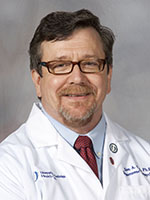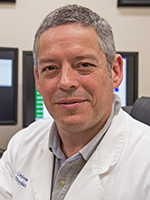Could new nasal spray help combat severe depression?
The first truly new drug for depression in 30 years is being hailed as a life-changing treatment for those who have tried other antidepressants with no success.
On March 5, the U.S. Food and Drug Administration approved the nasal spray formation of esketamine, a purified version of the drug ketamine. It works through a totally different mechanism than any other FDA-approved depression treatment, which researchers say might be the reason it helps people who haven’t been helped by other drugs.
One of esketamine’s attractions is that it can get results in just hours, in part because it’s inhaled or given via IV, allowing it to get to the brain quickly and start working faster.
The exact reason for that isn’t entirely clear.

Traditional antidepressants taken by mouth “take between four and six weeks to work, if they work,” said Dr. Ian Paul, professor of psychiatry and human behavior at the University of Mississippi Medical Center, who has devoted much of his life’s work to understanding depression, what triggers it and what gives relief.
Antidepressants “don’t work in about 30-35 percent of people treated, although for reasons we don’t understand, if you switch among the existing antidepressant drugs, you can get success closer to 75 percent of the time,” Paul said. “The problem is, four to six weeks is a long time to wait for a patient who is at high risk of self-injury or not functioning well.
“If you have to switch drugs or increase the dose, you are looking at six or eight or 10 weeks. You are working with a group of patients who often have characteristic feelings of hopelessness. If the drug doesn’t work quickly, they will assume that nothing is going to work.”
Self-administered by the patient as an inhalant only in an approved physician’s office under close supervision, esketamine is expensive. The recommended course of treatment is twice weekly for a month, then weekly or biweekly thereafter.
Generic ketamine that is FDA-approved as an anesthetic and pain reliever has been available for some years at clinics that have sprung up across the country. Those clinics administer ketamine through IV infusion.
It’s not approved as an antidepressant, but doctors for years have been prescribing it for such off-label medical use.

Dr. Allen Richert, UMMC associate professor of psychiatry, agrees with Paul that esketamine could be a game-changer.
“The reports are that the response can be very dramatic – a patient going from the depths of despair to feeling like they’re just a normal, everyday person,” Richert said. “It’s not a feeling like you just won the lottery, but a normal, everyday good mood within a matter of hours.
“I’m a little skeptical myself. I want to see it happen,” he said. “But what’s exciting is that it really does seem to help with mood, even if it’s not dramatic, and that it seems to be doing it through a completely novel approach to the neurochemistry of the brain.”
According to the FDA, there are some potential side effects, including disassociation or hallucinations, dizziness, nausea, sedation, vertigo, decreased feeling or sensitivity, anxiety, lethargy, increased blood pressure and feeling drunk. Those receiving it should not drive afterward but have someone on hand to take them home.
According to Paul and Richert, UMMC physicians likely will begin administering esketamine for severe depression in coming months.
Not enough is known about the long-term effects of esketamine “to be comfortable using it on a forever basis,” Paul said. “It’s possible that esketamine, combined with traditional antidepressants, might help them to work faster. That’s a guess at this point.”

Paul is working with Richert and Dr. Sara Gleason, associate professor of psychiatry, to develop an interventional psychiatry unit that will use ketamine drugs as antidepressants, with plans to conduct clinical trials on their potential value in treating posttraumatic stress disorder.
Esketamine “is not going to be a panacea for depression,” Richert said. “It’s not going to cure everyone, but it’s a game-changer, and it gives us new tools to treat this.
“People will want to give this a try.”



